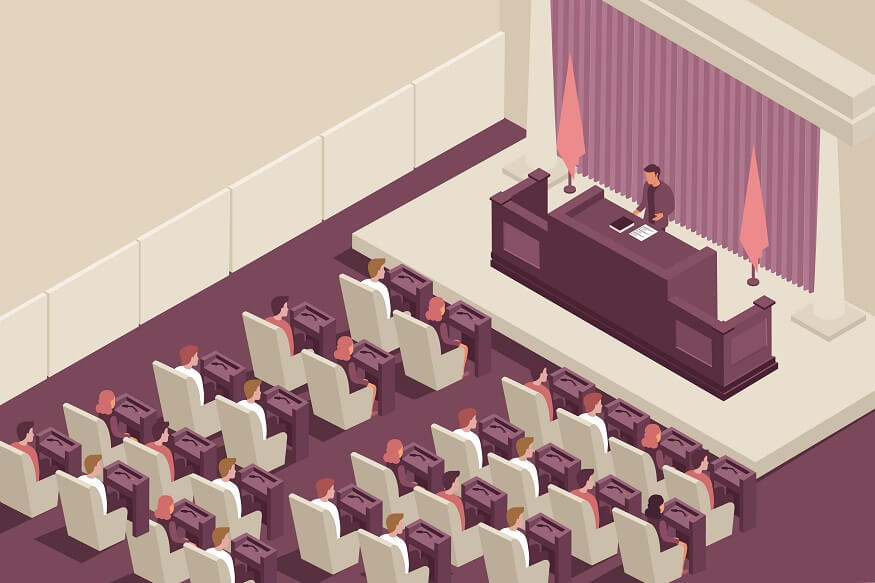A Member of Parliament (MP) holds a crucial position in a parliamentary democracy such as India. With 543 Lok Sabha (Lower House) MPs representing more than 1.2 billion people, a Lok Sabha MP represents more than 2.2 million people on average. A Rajya Sabha (Upper House) MP represents his State in Parliament, and as such, they play a crucial role in our federal political system.
This document briefly describes an Indian MP’s legislative, deliberative, and developmental functions and responsibilities. requirements to hold MPs accountable to the people are also noted when such requirements exist. The life of a Member of Parliament revolves around the following:
Also Read: SmartKid General Knowledge Olympiad
Responsibilities Of MP
A. The legislative role in the life of a Member of Parliament.
The primary role of an MP is seen as that of a legislator. According to Article 111 of the Constitution of India, any Bill is transformed into an Act
only when it is passed by both houses of Parliament and is given assent by the President. In the case of ordinary bills, a simple majority
(more than 50%) of the members (MPs) present in the house needs to vote in favour of the Bill for it to be considered as passed
by that House (Article 100). In the case of a Constitutional Amendment Bill under Article 368, a special majority of the MPs. This is among the primary Responsibilities of MP.
B. The deliberative role in the life of a Member of Parliament.
In the Indian constitutional scheme, the Executive (government) is made accountable to the legislature. This principle of
accountability is partially realised by government ministers, including the Prime Minister, being questioned by elected representatives (MPs) in Parliament. The rules of procedure in each House of Parliament contain provisions for a Question Hour
and a Zero Hour during which written and oral questions can be posed by MPs. These questions may encompass topics specific to
the State or the constituency represented by them.
C. Developmental role in the life of a Member of Parliament.
The developmental role of an MP is highlighted, in addition to their parliamentary responsibilities, as a vital aspect of their respective State or constituency. This role out of all the responsibilities of an MP can be fulfilled with the assistance of the following provisions:
- MPLADS – The Member of Parliament Local Area Development Scheme (MPLADS), introduced in 1993, allots an annual budget of Rs 5 crore to each MP for the initiation of developmental projects within their constituency. The scheme’s administration falls under the purview of the Ministry of Statistics and Programme Implementation (MoSPI), which prescribes guidelines concerning the permissible works and activities under MPLADS. The allocation of funds through MPLADS is carried out by the relevant implementing agencies at the district level. Further details on the scheme and the types of permissible projects are elaborated upon later in this document.
- Representation in local bodies – The Constitution, in Part IXA, includes provisions that enable the Legislature of a State to facilitate the representation of MPs at the intermediate and District level Panchayats (Panchayat Samiti and Zila Parishad). Similarly, Part IXA of the Constitution empowers the State legislature to facilitate the representation of MPs within municipal bodies situated in their respective constituencies. MPs may also receive nominations to District Planning Committees (DPCs), constitutional bodies responsible for the formulation of development plans for the district. For instance, in Maharashtra, the State government appoints MPs and MLAs to the DPC.
- Vigilance and monitoring of government schemes – MPs have been entrusted with a significant role in monitoring several Centrally Sponsored Schemes within their respective districts. The National Rural Drinking Water Programme (NRDWP) mandates the establishment of District Water and Sanitation Missions (DWSMs), of which all MPs and MLAs from the region become members. The DWSM assumes responsibility, among other things, for the formulation, management, and monitoring of projects related to drinking water security. It also oversees the evaluation and approval of schemes submitted by the Block Panchayat/ Gram Panchayat, as well as the coordination of matters concerning water and sanitation across various departments. Similarly, under the National Rural Health Mission (NRHM), MPs are expected to be included as members of the District Level Vigilance and Monitoring Committees (DVMC) tasked with reviewing the progress in the implementation of the scheme.
Participation of an MP in Lok Sabha
The work in Lok Sabha begins at 11 am and is ordinarily scheduled to be worked until 6 pm, with a lunch break from 1 pm to 2 pm. If the House decides, it can be worked through the lunch break or be worked beyond 6 pm.
In broadly two ways, the Lok sabha may be participated in by a Member of Parliament. In certain proceedings, speaking on behalf of their parties and being subject to the party whip may be done by MPs. This includes participation in discussions on government Bills, budgets, etc., in which the names of the MPs who would speak are decided by the party leadership. In certain other proceedings, such as Question Hour and some Zero Hour interventions, MPs are acted upon independent of their party affiliation.
It is chaired by the Speaker and consists of leaders of political parties in the House. It is decided by the committee that the business would be taken up in the week and time is allocated for each debate. Based on the nature of the intervention, time is either allocated to an individual MP or the time is distributed between the parties based on their strength in the House by the Speaker. Then, who will participate on its behalf in the proceedings is determined by the party leadership.
The Rules of Procedure guide all proceedings in the House, and they are implemented by the Speaker. The requirement for MPs to give prior intimation to the Secretariat/Speaker for asking questions, raising issues, initiating, or participating in debates is mandated by the Rules. This process is referred to as “giving notice.” For instance, to ask a question in the House, a notice of fifteen days is necessary. Some flexibility exists in the Rules to permit debates at shorter notice with the permission of the Speaker.
In some matters, discretion is granted to the Speaker by the Rules as well. For instance, the discretion to allow an MP to raise a matter of public importance is vested in the Speaker.
Also Read: Why is social studies so important and underestimated in children today?
Conclusion
At EuroSchool the child will learn about all roles and responsibilities of an MP as a citizen of India. The Indian constitution plays a huge role in every Indian citizen’s life.
Information like, In the House, all decisions are posed as motions, which are voted on by the House. Typically, the voting is done orally, with the motion being supported by MPs saying “aye” and opposed by those saying “no.” The motion is accepted if it is the Speaker’s opinion that more MPs are in favour of it. However, the option of requesting the Speaker to hold a recorded vote, known as a division, is available to every MP.










